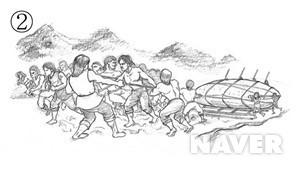GGHS 2019 Winter - Team 2
Write introduction about topic here.
Team
| No. | Team Topic | Teacher | Role | Name (Korean) | No. of Students |
|---|---|---|---|---|---|
| 2 | Dolmens of Ganghwa (강화의 고인돌) |
Evgeniia POLUMESTNAIA | Leader | 정가인 | 7 |
| Vice-Leader | 박진아 | ||||
| 홍지현 | |||||
| 심여빈 | |||||
| 홍연재 | |||||
| 이서현 | |||||
| 류가람 |
Ganghwa and the Dolmen
In our team, our main subject is 'Ganghwa and the Dolmen' . And For better
Dolmens in Bugeun-ri, Ganghwa
On July 11, 1964, it was designated as Historic Site No.137 It belongs to a large group of northern-style dolmen discovered so far, which is 2.6 meters high on the ground and the size of a covering stone is 7.1 meters long and 5.5 meters wide, and consists of granite. The number of dolmen in the vicinity of the area is 10 and nine are included in the World Heritage except for the one not designated as 128. It is located in front of the village hall in Daechon-Burak, and there are only four more U.S. troops left. The pedestal has only two long stones, approximately north and south. There have been several surface surveys so far, but no academic excavation has been conducted yet. There is another destroyed dolmen next to the dolmen, which is gone and only the lid of the stone remains vertical. In addition, there are about 10 North and South flats left in Ganghwado Island, including Samgeori and Hadori.[1]
The kinds of Dolmens
<Tokchasik Dolmen or Table Dolmen> A table dolmen is a type of flat or table-shaped stone made of three or four large well-crafted stone bricks, composed of ' ㄷ' or 'ㅁ' letters on the ground, laid flat on top of it, and placed on top of it with a huge stone. [2] [3] -A table dolmen picture
<Gibansik Dolmen or Underground Dolmen> It is called the "Sam style high mandol" or "Baduk style mandol." A tomb compartment is constructed underground and has three or four or more tombstones between it and the cover stone. [4]
<Gaesok dolmen or Graveyard dolmen> It is a type that is covered directly with a lid on a graveyard dolmen underground. [5]
What Kind Of Worth Does Dolmens Have To People In Ganghwa
The Definition of Dolmens
Rolls of Dolmen
Although there were many controversies over the function of the dolmen on the Korean Peninsula, it was confirmed that the stone was made for the purpose of the tomb in 1967 when the complete human bones were discovered at Hwangseok-ri Dolmen in Jecheon, North Chungcheong Province. However, some argue that the tomb was not just a function of the tomb. Although there is no objection to the fact that the tomb functioned as a tomb, some argue that the stone was made as a function of an altar or tombstone in addition to the tomb. Claiming the function of the altar, the table dolmen might have served as an altar rather than a tomb, citing the fact that they are located higher than the surrounding area so that people can easily see, and the appearance of grandeur on the pedestal, and the structure of the pedestal, which is difficult to form a tomb. In addition, in the case of a group of dolmen, sometimes the dolmen can be seen to be unusually large or different in direction than other dolmen, which is presumed to be a simple function that was built to reveal the authority and prestige of the tomb-building group
The Process Of Construction
Process of Making Dolmen[6]
Select useful stones for Dolmen
Process of Making Dolmen[7]
Use round logs to move the heavy stones to a certain area where they will build dolmen
Process of Making Dolmen[8]
Build pedestal with stones and pile up the soil.
Process of Making Dolmen[9]
Put a covering stone on and remove the soil.
Why there are many dolmen in Ganghwa
Ganghwa island is a place rich in mountains and water, and early ruling groups were formed to make dolmen. Also, there were many stones available to make dolmen, which were advantageous in making dolmen. As a result, about 150 of the 30,000 dolmen scattered on the Korean Peninsula are currently in Ganghwa. [10]
Map(s)
Network Graph(s)
- SAMPLE: VH2018_부석사reference.lst
- YOUR TEAM GRAPH: GGHS2019W_Team2.lst
References
- 인천광역시 문화유산 - 영문 해설문 포함 (한국학중앙연구원)
- ↑ 강화부근리고인돌군 (한국민족문화대백과사전)
- ↑ (문화원형백과)
- ↑ (네이버캐스트)
- ↑ (고고학사전)
- ↑ (blog The meaning of History)
- ↑ https://terms.naver.com/entry.nhn?docId=1582459&cid=47322&categoryId=47322
- ↑ https://terms.naver.com/entry.nhn?docId=1582459&cid=47322&categoryId=47322
- ↑ https://terms.naver.com/entry.nhn?docId=1582459&cid=47322&categoryId=47322
- ↑ https://terms.naver.com/entry.nhn?docId=1582459&cid=47322&categoryId=47322
- ↑ ,강화역사박물관




